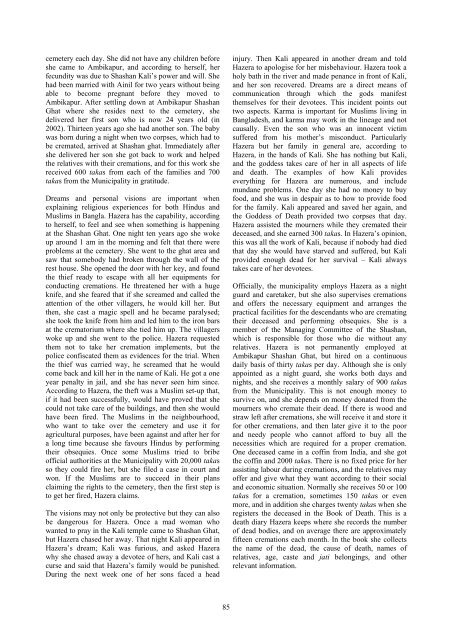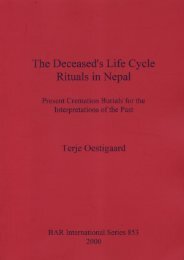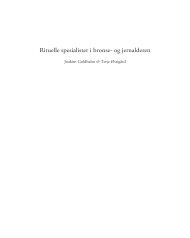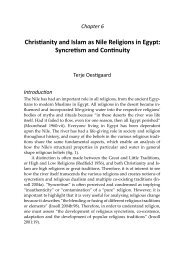Cremation, Caste, and Cosmogony in Karmic Traditions.
Cremation, Caste, and Cosmogony in Karmic Traditions.
Cremation, Caste, and Cosmogony in Karmic Traditions.
Create successful ePaper yourself
Turn your PDF publications into a flip-book with our unique Google optimized e-Paper software.
cemetery each day. She did not have any children before<br />
she came to Ambikapur, <strong>and</strong> accord<strong>in</strong>g to herself, her<br />
fecundity was due to Shashan Kali’s power <strong>and</strong> will. She<br />
had been married with A<strong>in</strong>il for two years without be<strong>in</strong>g<br />
able to become pregnant before they moved to<br />
Ambikapur. After settl<strong>in</strong>g down at Ambikapur Shashan<br />
Ghat where she resides next to the cemetery, she<br />
delivered her first son who is now 24 years old (<strong>in</strong><br />
2002). Thirteen years ago she had another son. The baby<br />
was born dur<strong>in</strong>g a night when two corpses, which had to<br />
be cremated, arrived at Shashan ghat. Immediately after<br />
she delivered her son she got back to work <strong>and</strong> helped<br />
the relatives with their cremations, <strong>and</strong> for this work she<br />
received 600 takas from each of the families <strong>and</strong> 700<br />
takas from the Municipality <strong>in</strong> gratitude.<br />
Dreams <strong>and</strong> personal visions are important when<br />
expla<strong>in</strong><strong>in</strong>g religious experiences for both H<strong>in</strong>dus <strong>and</strong><br />
Muslims <strong>in</strong> Bangla. Hazera has the capability, accord<strong>in</strong>g<br />
to herself, to feel <strong>and</strong> see when someth<strong>in</strong>g is happen<strong>in</strong>g<br />
at the Shashan Ghat. One night ten years ago she woke<br />
up around 1 am <strong>in</strong> the morn<strong>in</strong>g <strong>and</strong> felt that there were<br />
problems at the cemetery. She went to the ghat area <strong>and</strong><br />
saw that somebody had broken through the wall of the<br />
rest house. She opened the door with her key, <strong>and</strong> found<br />
the thief ready to escape with all her equipments for<br />
conduct<strong>in</strong>g cremations. He threatened her with a huge<br />
knife, <strong>and</strong> she feared that if she screamed <strong>and</strong> called the<br />
attention of the other villagers, he would kill her. But<br />
then, she cast a magic spell <strong>and</strong> he became paralysed;<br />
she took the knife from him <strong>and</strong> led him to the iron bars<br />
at the crematorium where she tied him up. The villagers<br />
woke up <strong>and</strong> she went to the police. Hazera requested<br />
them not to take her cremation implements, but the<br />
police confiscated them as evidences for the trial. When<br />
the thief was carried way, he screamed that he would<br />
come back <strong>and</strong> kill her <strong>in</strong> the name of Kali. He got a one<br />
year penalty <strong>in</strong> jail, <strong>and</strong> she has never seen him s<strong>in</strong>ce.<br />
Accord<strong>in</strong>g to Hazera, the theft was a Muslim set-up that,<br />
if it had been successfully, would have proved that she<br />
could not take care of the build<strong>in</strong>gs, <strong>and</strong> then she would<br />
have been fired. The Muslims <strong>in</strong> the neighbourhood,<br />
who want to take over the cemetery <strong>and</strong> use it for<br />
agricultural purposes, have been aga<strong>in</strong>st <strong>and</strong> after her for<br />
a long time because she favours H<strong>in</strong>dus by perform<strong>in</strong>g<br />
their obsequies. Once some Muslims tried to bribe<br />
official authorities at the Municipality with 20,000 takas<br />
so they could fire her, but she filed a case <strong>in</strong> court <strong>and</strong><br />
won. If the Muslims are to succeed <strong>in</strong> their plans<br />
claim<strong>in</strong>g the rights to the cemetery, then the first step is<br />
to get her fired, Hazera claims.<br />
The visions may not only be protective but they can also<br />
be dangerous for Hazera. Once a mad woman who<br />
wanted to pray <strong>in</strong> the Kali temple came to Shashan Ghat,<br />
but Hazera chased her away. That night Kali appeared <strong>in</strong><br />
Hazera’s dream; Kali was furious, <strong>and</strong> asked Hazera<br />
why she chased away a devotee of hers, <strong>and</strong> Kali cast a<br />
curse <strong>and</strong> said that Hazera’s family would be punished.<br />
Dur<strong>in</strong>g the next week one of her sons faced a head<br />
85<br />
<strong>in</strong>jury. Then Kali appeared <strong>in</strong> another dream <strong>and</strong> told<br />
Hazera to apologise for her misbehaviour. Hazera took a<br />
holy bath <strong>in</strong> the river <strong>and</strong> made penance <strong>in</strong> front of Kali,<br />
<strong>and</strong> her son recovered. Dreams are a direct means of<br />
communication through which the gods manifest<br />
themselves for their devotees. This <strong>in</strong>cident po<strong>in</strong>ts out<br />
two aspects. Karma is important for Muslims liv<strong>in</strong>g <strong>in</strong><br />
Bangladesh, <strong>and</strong> karma may work <strong>in</strong> the l<strong>in</strong>eage <strong>and</strong> not<br />
causally. Even the son who was an <strong>in</strong>nocent victim<br />
suffered from his mother’s misconduct. Particularly<br />
Hazera but her family <strong>in</strong> general are, accord<strong>in</strong>g to<br />
Hazera, <strong>in</strong> the h<strong>and</strong>s of Kali. She has noth<strong>in</strong>g but Kali,<br />
<strong>and</strong> the goddess takes care of her <strong>in</strong> all aspects of life<br />
<strong>and</strong> death. The examples of how Kali provides<br />
everyth<strong>in</strong>g for Hazera are numerous, <strong>and</strong> <strong>in</strong>clude<br />
mundane problems. One day she had no money to buy<br />
food, <strong>and</strong> she was <strong>in</strong> despair as to how to provide food<br />
for the family. Kali appeared <strong>and</strong> saved her aga<strong>in</strong>, <strong>and</strong><br />
the Goddess of Death provided two corpses that day.<br />
Hazera assisted the mourners while they cremated their<br />
deceased, <strong>and</strong> she earned 300 takas. In Hazera’s op<strong>in</strong>ion,<br />
this was all the work of Kali, because if nobody had died<br />
that day she would have starved <strong>and</strong> suffered, but Kali<br />
provided enough dead for her survival – Kali always<br />
takes care of her devotees.<br />
Officially, the municipality employs Hazera as a night<br />
guard <strong>and</strong> caretaker, but she also supervises cremations<br />
<strong>and</strong> offers the necessary equipment <strong>and</strong> arranges the<br />
practical facilities for the descendants who are cremat<strong>in</strong>g<br />
their deceased <strong>and</strong> perform<strong>in</strong>g obsequies. She is a<br />
member of the Manag<strong>in</strong>g Committee of the Shashan,<br />
which is responsible for those who die without any<br />
relatives. Hazera is not permanently employed at<br />
Ambikapur Shashan Ghat, but hired on a cont<strong>in</strong>uous<br />
daily basis of thirty takas per day. Although she is only<br />
appo<strong>in</strong>ted as a night guard, she works both days <strong>and</strong><br />
nights, <strong>and</strong> she receives a monthly salary of 900 takas<br />
from the Municipality. This is not enough money to<br />
survive on, <strong>and</strong> she depends on money donated from the<br />
mourners who cremate their dead. If there is wood <strong>and</strong><br />
straw left after cremations, she will receive it <strong>and</strong> store it<br />
for other cremations, <strong>and</strong> then later give it to the poor<br />
<strong>and</strong> needy people who cannot afford to buy all the<br />
necessities which are required for a proper cremation.<br />
One deceased came <strong>in</strong> a coff<strong>in</strong> from India, <strong>and</strong> she got<br />
the coff<strong>in</strong> <strong>and</strong> 2000 takas. There is no fixed price for her<br />
assist<strong>in</strong>g labour dur<strong>in</strong>g cremations, <strong>and</strong> the relatives may<br />
offer <strong>and</strong> give what they want accord<strong>in</strong>g to their social<br />
<strong>and</strong> economic situation. Normally she receives 50 or 100<br />
takas for a cremation, sometimes 150 takas or even<br />
more, <strong>and</strong> <strong>in</strong> addition she charges twenty takas when she<br />
registers the deceased <strong>in</strong> the Book of Death. This is a<br />
death diary Hazera keeps where she records the number<br />
of dead bodies, <strong>and</strong> on average there are approximately<br />
fifteen cremations each month. In the book she collects<br />
the name of the dead, the cause of death, names of<br />
relatives, age, caste <strong>and</strong> jati belong<strong>in</strong>gs, <strong>and</strong> other<br />
relevant <strong>in</strong>formation.











![Fullmono-AK [P2118].indd - oestigaard](https://img.yumpu.com/18994998/1/177x260/fullmono-ak-p2118indd-oestigaard.jpg?quality=85)